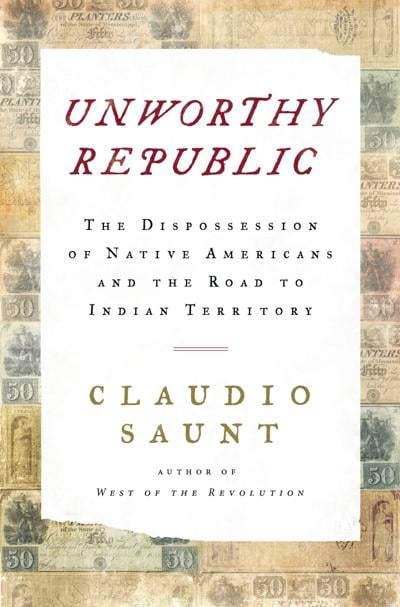- Get link
- X
- Other Apps
Review: "Unworthy Republic: The Dispossession of Native Americans and the Road to Indian Territory"
“Unworthy Republic” is an unflinching chronicle of the confiscation of millions of acres of homelands belonging to Native Americans and the expulsion and deportation of more than 80,000 of them to unknown territories west of the Mississippi River.
The Indian issue had been a nagging problem since the founding of the nation. “George Washington had even spoken of building a ‘Chinese wall’ between the United States and the Cherokee.” President Andrew Jackson proposed a “twelve-hundred-mile military cordon [that] would eventually run from present-day Minneapolis to the Gulf Coast.”
Congress passed the Indian Removal Act in May 1830, “to provide for an exchange of lands with the Indians residing in any of the states or territories, and for the removal west of the river Mississippi.” When President Jackson signed the bill, he authorized one of the first state-sponsored mass deportations in the modern era. The legislation provided no specifics about how Indians were to be compensated for their properties or how they would be transferred to undetermined sites.
Saunt focuses on the years leading up to the 1838 Trail of Tears when President Martin Van Buren and the federal government forced the Native Americans of the South to make a grueling, 1200-mile, cholera-riddled journey to the yet-to-be-organized Oklahoma territory. The deceptive and brutal migration killed more than 3,000 Native Americans, but their forced ejection opened huge landmasses to white supremacist Georgia slave owners and their Northern financier backers who were determined to expand their cotton empires into present-day Alabama and Mississippi. This readable history graphically recounts the injustices perpetrated on Southern tribes, but it also looks at the debacle of similar policy and practices being used to remove Northern tribes from areas where states were being carved out of the Northwest Territory.
The narrative does include accounts of those who opposed the “Indian removal,” including some generals ordered to lead the deportation and the words of white government officials who spoke out against this “betrayal of American values.” The bill was fiercely contested in Congress and was passed by only a razor-thin margin. Native Americans fought tirelessly against the policy. John Quincy Adams called it “among the heinous sins of this nation, for what I believe God will one day bring them to judgment.”
Relocating these Native Americans came at a tremendous economic cost to the U.S. government. “The federal government expended about $75 million to expel native peoples from their homelands,” Saunt reports. “Vast sums passed through the War Department to fund the dispossession. In the pivotal year of 1836, more than forty-percent of every federal dollar went to enforce the ‘Act to provide for an exchange of lands.’”
In the exchange, the Creeks, Chickasaws, and Choctaws lost a total of $25 million in personal wealth, equivalent to more than $700 million in today’s dollars. Having originally budgeted $500,000 to carry out the Indian removal policy, the final cost to the federal government was about $75 million, equal to $1 trillion today. But none of these expenses measure up to the emotional and traumatic costs suffered by the deportees.
Saunt attributes the expulsion of the Cherokee, Creek, Chickasaw, Choctaw, and Seminole nations to the South’s fear that native people might join African Americans to organize an uprising. He also likens the removal to the Nazi-directed Holocaust and to the current effort in the United States to keep certain classes of people from emigrating.
Saunt’s book is thoroughly researched and quietly angry. It offers the most detailed account to date of the Indian expulsion, relocation and, some would claim, extermination. It exposes the politics and economics of white supremacy and the indifference and incompetence demonstrated by the federal government in executing this terrorizing policy. “Unworthy Republic” is an authoritative, much-needed depiction of a disturbing period in American history.
- Get link
- X
- Other Apps


Comments
Post a Comment